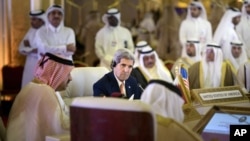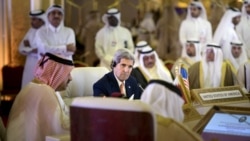The United States’ partnership with the Gulf Cooperation Council nations is critical to stability and security in the region.
On his recent visit to Doha, U.S. Secretary of State John Kerry emphasized the many areas of cooperation between the U.S. and the Gulf countries, including counterterrorism, counterinsurgency, and the implementation of an integrated ballistic missile defense capability. They also discussed strategies to combat violent extremism, specifically Da’esh and al-Qaida.
The Gulf Cooperation Council, or GCC, agreed to intensify its support and cooperation with the Government of Iraq, where they partner with the U.S. in its efforts to degrade and defeat Da’esh.
Secretary Kerry also announced that the U.S. will contribute an additional $62 million in humanitarian assistance to Iraqis who are in need.
With regard to the crisis in Syria, the U.S. policy is very clear. “We believe,” said Secretary Kerry, “that Assad and the Assad regime long ago lost legitimacy, in part because of the regime’s continued brutality against the Syrian people themselves. And that has been a magnet for foreign fighters.”
The U.S. continues to support the moderate Syrian opposition and will remain relentless in its mission to eliminate the safe haven that Da’esh has found within Syria.
In Yemen, the best way forward is a return to the political transition process set forth in the GCC initiative and National Dialogue Conference. The U.S., along with the GCC, condemns the continued destabilizing activities of the Houthis. Both the GCC and the United States are deeply concerned about the dire humanitarian situation in Yemen, and urge all parties to allow for the unimpeded entry and delivery of essential relief items to the civilian population nationwide.
Finally, in Libya, the U.S. continues to support the UN-led political process and calls on Libyan leaders to join in supporting a political agreement that will lead to the formation of a Government of National Accord.
The U.S. and Gulf Cooperation Council nations are committed to building a stronger, enduring, strategic partnership poised to take on the region’s toughest challenges.






